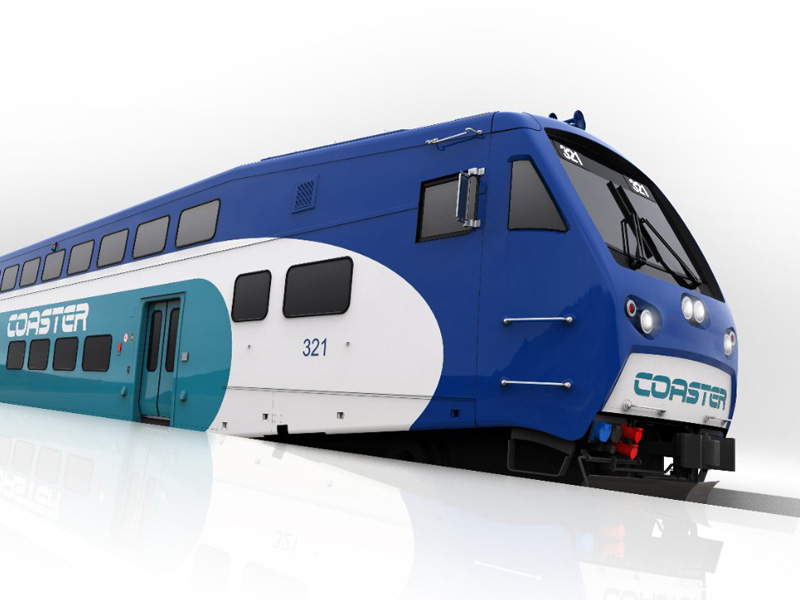Latest evolution of the popular BiLevel car offers a Crash Energy Management system and new amenities designed to enhance the passenger experience
Represents third BiLevel car contract for U.S. transportation authorities this year

The base order, valued at approximately $43 million US (37 million euro), includes eight coaches and two cab cars to support the San Diego Association of Governments (SANDAG) 2050 Revenue Constrained Regional Plan (Regional Plan) for increased service levels, as well as an additional cab car. NCTD also has the option to purchase up to 27 additional cars to support its ongoing state of good repair needs.
NCTD currently operates a fleet of seven locomotives and 28 BOMBARDIER BiLevel cars on the San Diego Subdivision to support COASTER operations from Oceanside to downtown San Diego. Currently, COASTER rail service provides 22 regularly scheduled weekday trips and eight weekend trips. Headways between trains vary from 45 to 60 minutes during peak periods and more than 3.5 hours during the non-peak period.
With the addition of the expansion equipment, NCTD will be able to implement significantly increased frequencies that were approved for funding by the SANDAG Board of Directors in September 2019. Peak period frequencies will be increased to 30-minute headways and non-peak period frequencies will be increased to 60-minute headways. This will result in 42 trains per day, nearly doubling current service.
“As we look to the future, NCTD will be in a position to continue moving forward, offering customers an outstanding riding experience and providing increased service along the rail line,” said Tony Kranz, NCTD Board Chair and Encinitas Councilmember. “With these two additional trainsets in the fleet, commuters will have a number of train runs throughout the day to meet their needs; and that really makes the decision to try transit an easy one.”
“SANDAG and NCTD are committed to improving the Los Angeles-San Diego-San Luis Obispo (LOSSAN) Rail Corridor, which supports goods movement, commuters and our nation’s military,” said SANDAG Chair and Poway Mayor Steve Vaus. “Just last year, the SANDAG Board of Directors approved $58.8 million in funding for additional train sets to meet our goals of increased capacity, speed and safety.”
“We’re confident that our new BiLevel cars for the COASTER commuter rail fleet, with their enhanced technical features and passenger amenities, will provide exceptional service and meet passengers’ evolving expectations,” said Elliot G. (Lee) Sander, President, Americas Region, Bombardier Transportation. “We’re pleased to continue our long-term partnership with NCTD, not only as the manufacturer of BiLevel cars but also as the operations and maintenance provider for both the COASTER and SPRINTER rail services. We’re proud to be working with our valued customer to provide safe and reliable transportation for the citizens of San Diego County.”
First introduced in 1978, the BiLevel car is the most popular double-deck commuter rail car in North America and is in operation at 14 transportation authorities across the United States and Canada. While fully complying with U.S. Federal Railroad Administration (FRA) and American Public Transportation Association (APTA) standards, the BiLevel car is the lightest and most cost-efficient double-deck car in North America. One of the keys to the BiLevel car’s success has been its ability to adapt to meet changing needs and requirements. The latest steps in that evolution include BiLevel cars equipped with a Crash Energy Management system, full width cab, upgrades to air conditioning systems and enhancements to passenger amenities such as power outlets and USB ports at seats, more comfortable seating, electronic door systems, LED lighting and electronic bells. A more aerodynamic cab car and new lighting will reduce fuel consumption and increase energy efficiency.
The new cars will be built at Bombardier’s manufacturing site in Thunder Bay, Canada. Deliveries are scheduled to take place in the fall of 2022. After testing and commissioning, the cars will begin to enter service that winter.









